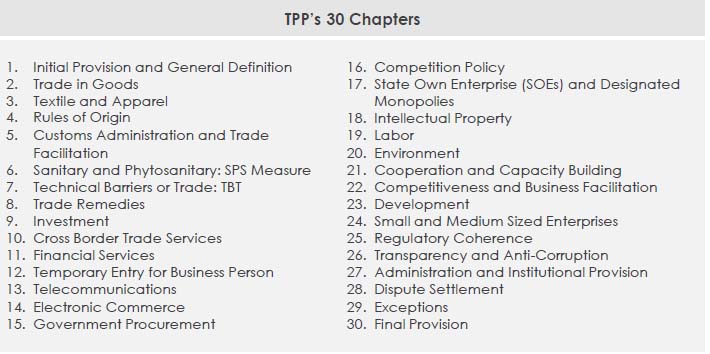Will the TPP free trade agreement have a negative effect on Thailand?
Asian Correspondent | 30 November 2015
Will the TPP Free Trade Agreement have a negative effect on Thailand?
AFTER five years of secretive negotiations, the terms of the Trans-Pacific Partnership (TPP) were recently agreed on by the 12 countries involved: US, Japan, Malaysia, Vietnam, Singapore, Brunei, Australia, New Zealand, Canada, Mexico, Chile and Peru. In a press conference announcing the agreement on 5 October, trade ministers from the US, Australia and Japan called the agreement “ambitious” and “challenging” adding that it will cut red tape globally and “set the rules for the 21st century for trade”.
One notable absentee was Thailand, with Prime Minister Prayuth Chan-ocha quoted as saying “there are many parts to look at as we don’t want to add a burden to the country.”
While the TPP will take many years to actually implement, it is likely to mean a major change in trade relations between the USA and TPP members. Nonetheless, the fact that Thailand is not presently set to join the TPP has caused concern and confusion among Thailand’s business leaders.
With these concerns in mind, Dataconsult in Bangkok invited Dr. Rachda Chiasakul, a specialist in Thai FTAs and advisor to the present government, to host November’s event under the title: ‘The Conclusions of TPP: What is next for Thailand?’
Below is a summary of the presentation made by Dr. Rachda.
TPP and Thailand
Negotiations for a FTA with the USA have been on hold since 2005, following protests against the government of Prime Minister Thaksin Shinawatra. The TPP came up for discussion again in 2011 during the leadership of PM Abhisit Vejjajiva; yet it was considered politically imprudent to take part in secret negotiations during the frequently turbulent yellow/red shirt protests of the period.
Since 2005, Thailand has conducted much research on the trade outcomes of its existing FTAs with Australia, China, India, S. Korea and the other ASEAN countries. They’ve also spent time looking at how FTAs with the USA have impacted other countries, and made predictions about how the expected requirements of the TPP would be received locally. Thus, the decision not to enter the TPP at this stage has been carefully calculated.
The TPP is broken into 30 chapters (you can read the whole agreement here), and Dr. Rachda believes that the terms are preferable to those on offer during 2005’s FTA negotiations with the USA. While those negotiations mandated a full liberalisation of the financial sector, state-owned enterprises are no longer obligated to privatise, merely encouraged to do so.

Thailand’s objections to the TPP
Thailand has four major areas of opposition to joining the TPP. These are: 1) drug patents: the time taken to release generic drugs, as well as the potential for price increases due to ‘data exclusivity’; 2) patents on plants and animals: local communities may be negatively affected, and there’s increased risk of ‘bio-piracy’; 3) geographical identification: trademarks concerns about other countries registering Thai products as their own; 4) copyright law: increased copyright protection may hinder knowledge transfer. See the image below for more details.

TPP impact on Thailand
Thailand is an integral part of the AEC – which comes into effect on 1 January, 2016; however, the AEC has no centralized Brussels-style bureaucratic means of enforcement, unlike the TPP which will be heavily policed. While the TPP still needs to be ratified by domestic governments, the 12 countries involved will benefit from ongoing behind-closed-doors negotiations to which Thailand will not be privy.
The psychological effect of not signing the TPP is likely to have a harmful impact on trade as Thailand will be seen as isolationist, even to countries with existing FTAs. Textiles, apparels, rice, seafood and electrical appliances made up 45 percent of Thailand’s total exports to the US in the first eight months of 2015, and without a FTA, much of that business is expected to go to fellow TPP member countries.
Can Thailand still join the TPP?
It is still possible for Thailand to join the TPP; however, negotiations would need to take place with each country individually. If the 12 existing countries agree to allow Thailand to join it would be a case of submitting the correct documents and committing to comply with the rules of the TPP.
Now that the TPP has been made public, it may be easier for Thailand to enter negotiations. While previous governments had to consider the public reaction to secretive negotiations, the fact that the document can now be read in full means that arguments can be made both for and against with clear supporting evidence.
In a round-table discussion following her presentation, Dr. Rachda fielded questions from business leaders and embassy staff. Many of these questions were sceptical about the TPP, partly due to its length and the fact that it had been shrouded in secrecy prior to October.






